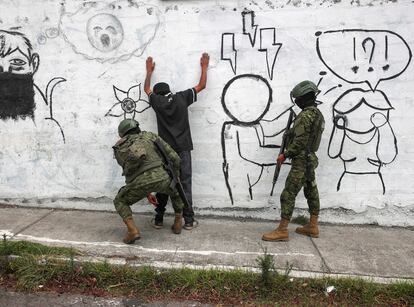Ecuador: A nationwide fight against drug trafficking
The country is enduring a process similar to that experienced by Colombia in the 1980s and Mexico a few years later with an escalation of violence

I moved back from Ecuador to Colombia in 2017, after serving as Secretary General of UNASUR (Union of South American Nations). I spent three wonderful years of peace and tranquility in Quito, and during this time I witnessed Ecuador’s economic and social growth. When I departed, President Rafael Correa was in the process of leaving the country in an entirely different position to the one he had inherited. I returned to Colombia convinced that under Correa’s model of democratic socialism in Ecuador, and that of Evo Morales in Bolivia, it was possible to pursue social inclusion without succumbing to economic populism. This could be done through democratic means without sacrificing the role of the State or demonizing the market.
Correa’s Citizen’s Revolution was one of enhancing self-esteem as it gave all Ecuadorians a sense of pride in the eyes of the world due to its Millennium schools, refurbished hospitals, highways, airports, aqueducts and universities. Through dollarization (albeit at a cost of monetary sovereignty) — which had been in place since before Correa’s tenure — and buoyant oil prices that stabilized the economy, resources were obtained and managed to finance an alternative development model and overcome the misleading dilemma of progress and welfare. It has been demonstrated that it is possible to achieve growth and equal distribution at the same time. This is backed up by figures from the Economic Commission for Latin America and the Caribbean (CEPAL).
So what went wrong? At what point did Ecuador decline into present-day hell? The inadequate governments that came after Correa, coinciding with the internationalization of the Mexican drug cartels that arrived in Colombia, paved the way for the entry of these criminal groups that brought corruption and violence stemming from drug trafficking to our countries. As a result, Ecuador underwent a process of “Colombianization” owing to the recurrence of the same problems that Colombia experienced in the 1980s, just as Mexico did a few years later.
It would therefore be unfair and rash to accuse former president Correa — who has not been able to return to his country on the Kafkaesque accusation of having “psychically influenced” his officials — of the turmoil that is unfolding in this neighboring and beloved country. As far as I know, Rafael Correa is a competent and transparent person. He is austere in his personal life and possesses a fiery passion, as is fitting for his country’s geographical wonders, for everything concerning Ecuador. In the current tragic circumstances, it does not help to confuse the trial of accountability for the vicious murder of Fernando Villavicencio — who I knew personally — with the electoral alternatives available to Ecuadorians to decide freely who should govern them in a few days’ time.
When Luis Carlos Galán was assassinated many years ago in Colombia by criminal forces very much like the ones that took Villavicencio’s life this week, all the presidential candidates convened at the Palacio de Nariño (Colombia’s presidential residence), summoned by then-president Virgilio Barco. It was agreed that we would pursue our campaigns in homage to Galán and as a resounding response to the challenges posed by the violence of the drug trafficking trade. Since then, the fight against organized crime has become State policy in Colombia and continues to be so today. What Ecuador needs at this moment, as we did in Colombia in the 1990s and Andrés Manuel López Obrador is currently doing in Mexico, is to unite against the dark forces of organized crime, which have declared war on the rule of law and democratic institutions. This would be a fitting tribute to the fallen leader and an opportunity to retake the road to the future and dignity that began to develop under the Citizen’s Revolution. Ecuadorians certainly deserve it.
Sign up for our weekly newsletter to get more English-language news coverage from EL PAÍS USA Edition
Tu suscripción se está usando en otro dispositivo
¿Quieres añadir otro usuario a tu suscripción?
Si continúas leyendo en este dispositivo, no se podrá leer en el otro.
FlechaTu suscripción se está usando en otro dispositivo y solo puedes acceder a EL PAÍS desde un dispositivo a la vez.
Si quieres compartir tu cuenta, cambia tu suscripción a la modalidad Premium, así podrás añadir otro usuario. Cada uno accederá con su propia cuenta de email, lo que os permitirá personalizar vuestra experiencia en EL PAÍS.
¿Tienes una suscripción de empresa? Accede aquí para contratar más cuentas.
En el caso de no saber quién está usando tu cuenta, te recomendamos cambiar tu contraseña aquí.
Si decides continuar compartiendo tu cuenta, este mensaje se mostrará en tu dispositivo y en el de la otra persona que está usando tu cuenta de forma indefinida, afectando a tu experiencia de lectura. Puedes consultar aquí los términos y condiciones de la suscripción digital.








































